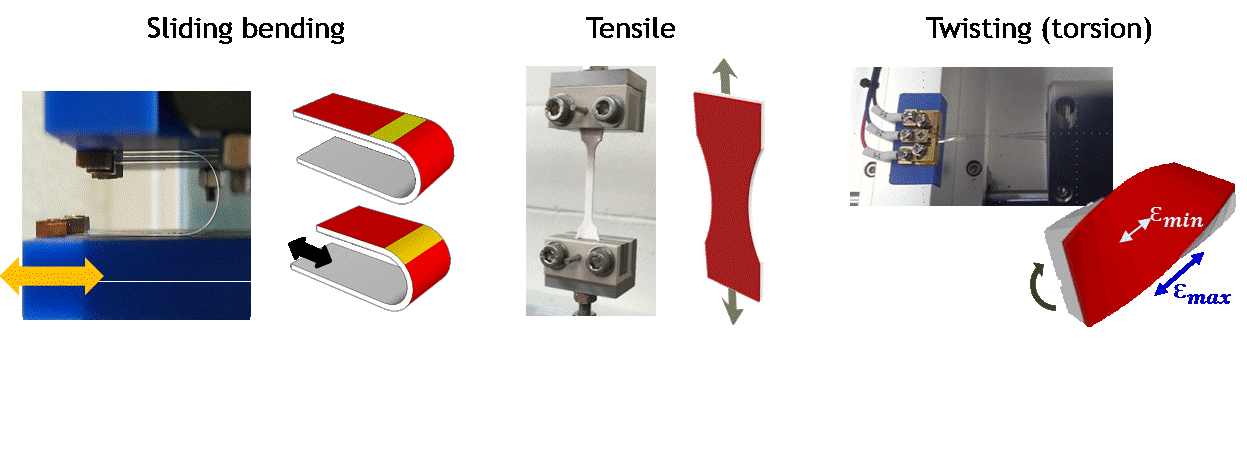Modern flexible electronic devices are evolving into multifunctional devices that are wearable, attachable, and even operable in the human body. Mechanical stress or strain applied to the flexible devices are becoming more complex as those demands increase, therefore mechanical reliability problems of devices which results from the deformation are critical issues. In order to solve the reliability problems, our research group is investigating various methodologies for evaluating the mechanical reliability of flexible devices, identifying failure mechanisms by tensile and fatigue application of flexible devices, and suggesting the solutions for improving reliability. Since the reliability of a flexible device is directly related to deterioration of electrical 0performance, a system capable of observing electrical performance in real time during mechanical deformation is provided.
Mechanical deformations that flexible devices undergo are very diverse including bending, folding, rolling, biaxial tension, and twisting. The simplest mode of deformation is uniaxial deformation such as bending or tensile. In particular, since the bending deformation could perform both tensile and compressive deformation simultaneously, researches of bending deformation of electronic materials occupy the largest part of the reliability study of flexible devices. In fact, there are many ways to apply bending deformation, the stress generated by the deformation varies greatly depending on the method of applying deformation. Though the difference, there is no standard in terms of the evaluation method yet. Similar problems are also discussed in more complex deformations such as rolling, twisting, as well as non-bending deformations. In order to solve this problem, we are studying the standardization of mechanical reliability evaluation technology.
Mechanical reliability of materials is a fundamental element that must be performed prior to mechanical reliability evaluation of integrated devices. It is very important to understand the mechanical properties of materials and to apply appropriate performance evaluation methods because mechanical and electrical characteristics are vary depending on materials, i.e. metals, ceramics, and polymers. The inherent mechanical properties of the material can be determined by the microstructure or architecture, even if they are the same material. Our groups treat the mechanical reliability of various electronic materials, and studies on reliability improvement through microstructure and process control are being carried out.
In addition to the reliability of materials, reliability of interfacial from device integration is also becoming an important topic in recent years. The polymer substrate, metal interconnects, and active device, which form flexible devices, show large difference in mechanical properties such as elastic modulus and Poisson’s ratio, which could cause the stress concentration hetero-interface and finally results in mechanical failure. To solve the reliability problem of heterogeneous interfaces, it is important to reduce the mechanical property gap between the element materials. Our groups are studying the research of tunable mechanical property of the material through process control and various architectural designs, and by doing so, decreasing the mechanical property gap between elementary materials and developing mechanically stable flexible devices.
